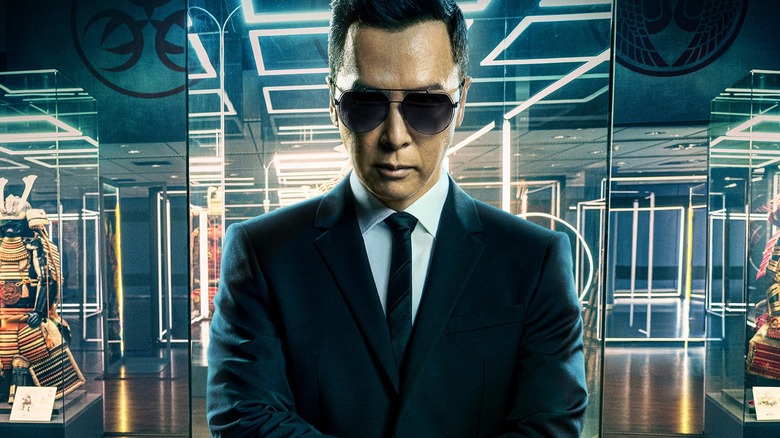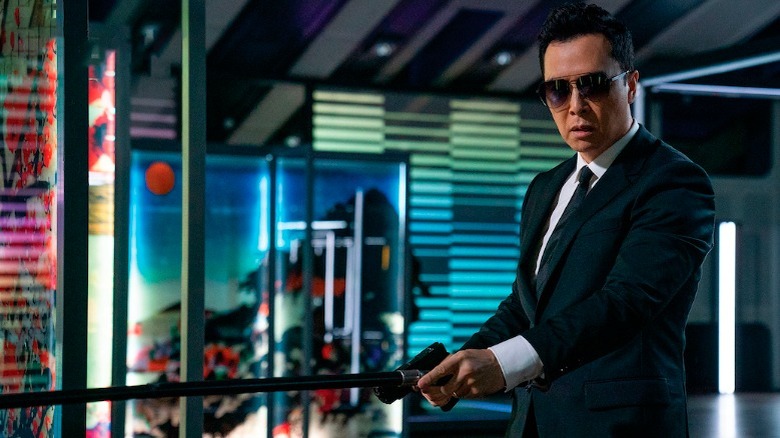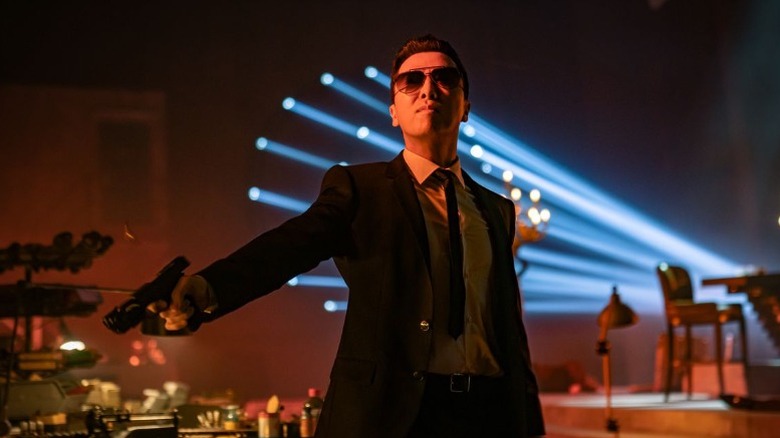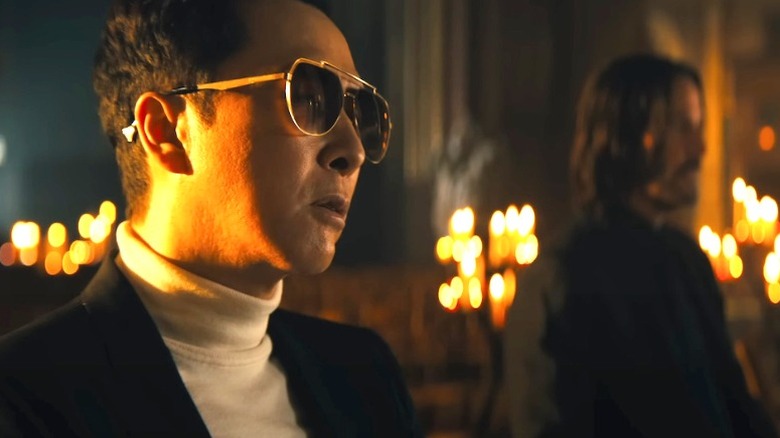Donnie Yen's John Wick: Chapter 4 Character Is The Best Part Of A Movie With Many Best Parts
Keanu Reeves may be the centerpiece of the "John Wick" films, but the fourth and final chapter finds the perfect match for the titular character in martial arts star Donnie Yen as Caine. Yen has been acting in Hong Kong martial arts films for at least three decades, but English-speaking audiences who may be unfamiliar with his prolific body of work at least know him from the "Star Wars" spin-off "Rogue One," in which he played the blind warrior monk Chirrut Imwe. That may sound familiar to his "John Wick" role, but Yen approaches the two characters with two distinct styles and personalities, a testament to his talent as both an actor and a martial artist.
Caine acts as both the ally and rival of John Wick, the reluctant antagonist who's forced to kill his friend because the bigger bad guy — Marquis de Gramont — is threatening his daughter's life. John Wick may execute a lot of crime bosses and their henchmen throughout the series, but none of his opponents present the complicated moral quandary that Caine does. Besides that element, Caine is just plain cool. Yen gives him a sense of aloofness that acts as a mark of confidence, but he's also a man of true honor and integrity. Although the audience is used to rooting for Wick, Caine may be the first person he's faced that's truly difficult to side against. On the contrary, Yen's charisma and Caine's motivations make it much easier to hope that he makes it out of the film alive.
The allure of the blind assassin
As the "John Wick" series developed, the continued worldbuilding of the near-fantastical assassin underworld introduced a heap of colorful side characters that serve more of a purpose than just punching bags and shooting targets. Some of these are antagonists that are big boss battles for John Wick, and some of them, like Laurence Fishburne's Bowery King introduced in "Chapter 2," or Halle Berry's Sofia Al-Azwar in "Chapter 3," are allies. Caine, however, is both (along with Shamier Anderson's Mr. Nobody). Yen's presence tells the audience that Caine is not one to mess with, but his charisma and mercy make him outshine the typical repugnance of "John Wick" villains, ever since the Russian mob killed John's dog in the beginning. That moral dynamic is a fresh idea in a series that could run stale.
Donnie Yen is so mesmerizing to watch that he nearly steals the show from Keanu Reeves. The "John Wick" movies smartly avoid making the title character a quippy, sarcastic action hero; John is haunted by his past and has no time for comedy. Caine isn't exactly a prankster, but he seems less intense than John on the surface. He calmly puts down a drink before fighting, literally winding up his fist before punching someone in the face, and evokes a sort of "Drunken Master-"esque physical comedy. That isn't to say that Caine doesn't have his own gravitas-laden baggage, but Yen adds another layer of fun to an already exhilarating piece of cinema.
A creative combatant
Donnie Yen started out in wuxia classics like "Iron Monkey" and "Hero" before turning into a household name with the incredibly successful "Ip Man" series. The superstar has become so successful in Hong Kong and China that he's turned down multiple blockbuster roles like "The Expendables 2" and "Aquaman," expressing that he wants creative control. He's also highly selective about his films' portrayal of Chinese culture, and helped shape his characters in both "Rogue One" and "John Wick." Chirrut Imwe's dry sense of humor is from Yen wanting to invigorate a part that was supposed to be a stereotypically stoic kung fu master. Yen also was the one who convinced "John Wick" director Chad Stahelski to change his character's original name of "Shang or Chang" to the less "generic" Caine, while also giving him a "cool suit" instead of "mandarin collars."
Stahelski's background as a stunt choreographer also allowed Yen to enjoy a sort of freedom with his martial arts skills, that many Americans may have never witnessed before. The Zatoichi-esque blind warrior is an archetype that has existed for more than half a century, but Yen has pulled off creating not one but two completely unique versions of the character. Chirrut is a more traditional, heroic interpretation that encapsulates the mystical side of the "Star Wars" universe, whereas Caine fits more snugly within the violent, morally gray world of "John Wick." In other words, Chirrut Imwe is a guardian; Caine is an assassin.
A yearning for Yen
It's been a long time coming for American audiences to recognize how great Donnie Yen is. His Hong Kong and Chinese productions have gained a massive following in the Sinophone world and launched a wave of close-combat, Wing Chun-style martial arts films, but it took years for Hollywood to embrace Yen's cinematic prowess. That may be because the actor, who also choreographs his own fighting, wasn't fond of the rushed experiences he had working on American film sets. Yen has a deft understanding of the cinematic language that he learned working under the tutelage of director and choreographer Yuen Woo-ping, and meticulously plans his actions for each scene. In an interview (via GQ), he explained just how detailed he can get:
"You learn to be so precisely on point and accurate at every angle. I know exactly where the camera is. If you place the camera over there, I already know exactly where the frame is ... I move this way towards this medium shot, then I reserve this movement, four, five, and six, to the wider shot. I know seven, eight is going to be the close-up."
The American productions he was hired for, however, expected quick work. Yen said that choreographing the action on "Blade II" was "one of the worst times in [his] career," explaining that the producers wanted him to craft his highly technical, refined stunts in just "a couple of hours" (he had no qualms about Guillermo del Toro). In contrast, the actor said that Stahelski is a "film librarian" who "knows what's going on," and that he's enjoyed working on "John Wick: Chapter 4" more "than any of [his] previous Hollywood movies." Finally, Yen felt right at home.



